JICAインターン生が取材しました!長期研修員の魅力③English
2024.12.04
The Graduate Course Program Division in JICA Tokyo has been accepting six students from Japanese Universities under JICA Internship Program as of 2024. As a part of their activities in JICA Tokyo, we would like to introduce the interviews with foreign students from developing countries under the program of JICA.
Ms. Nagisa Natsuha, University of Tsukuba, Graduate School of Business Sciences, Humanities and Social Sciences
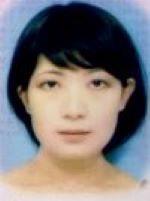
I have interviewed with three JICA scholars under the JICA scholarship program of “Developing Core Human Resources in the Water Supply Sector Program”, and asked about their stories and opinions from several aspects.
◆ JICA scholars who kindly accepted an interview.
Ms. ZIKRINA Masayu Nadiya
From Indonesia
Master’s degree at Tokyo University
works in Ministry of Public Works and Housing in Indonesia
Course name: Water Engineering and Utility Management for Future Leaders (FY2021-2023)/2022/The University of Tokyo/Master
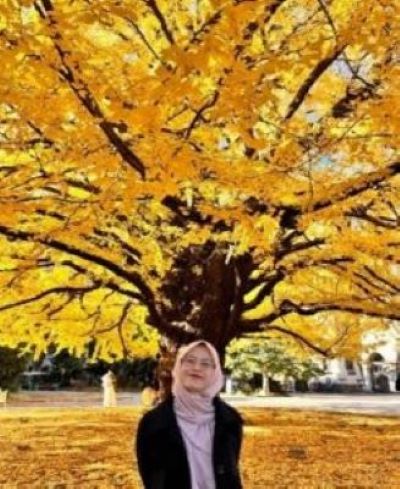
Mr. AMIN Saiful
From Indonesia
Master’s degree at Tokyo University
works in Ministry of Public Works and Housing in Indonesia as environmental engineer.
Course name: Water Engineering and Utility Management for Future Leaders (FY2021-2023)/2022/The University of Tokyo/Master
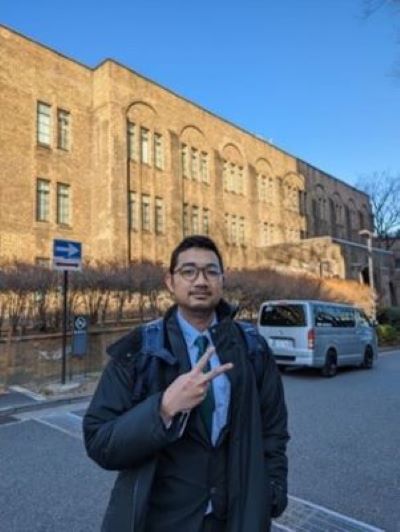
Ms. UMUHOZA Marie Grâce
From Rwanda
Master’s degree at Toyo University
works in a water and sanitation company in Rwanda as Sanitation Infrastructure Development Engineer.
Course name: Water Engineering and Utility Management for Future Leaders (FY2021-2023)/2022/Toyo University/Master
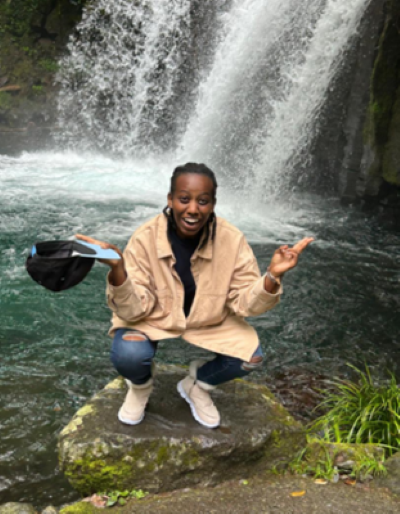
◆ What is “Developing Core Human Resources in the Water Supply Sector Program”?
This program is designed for young staffs in waterworks companies and organizations in Asia/Africa region, aiming for developing core members of waterworks and water supply sectors of each country. Those scholars in this program are expected to be executives in their company or organization and to be a leader of water supply sectors in each country.
Ms. Masayu
Since I had lived in Jakarta all my life until graduating from university, I had never known much about situations of water infrastructure in rural areas in Indonesia before I started working in my department and visiting other areas. I realized how fragile those infrastructures in non-urban cities were through my work and thought that I want to study more about this area.
Mr. Saiful
I have been interested in environmental problems in general for quite a long time, so I studied in Department of Environmental Engineering for my bachelor’s degree, so that I could contribute to solving environmental problems in any way I could.
After I joined in Ministry of Public Works and Housing and built up my experience, I came to desire to deepen my knowledge about this area.
Ms. Grâce
Water supply has been a quite realistic issue since I was a child. Due to the genocide occurred against the Tutsi ethnicity in 1994, most public infrastructures including water supply systems were destroyed in the year when I was born (1995). Experiencing this environment, I was eager to make a society where people can have enough access to purified and safe water and decided to study in this area.
Ms. Masayu
I have been interested in studying abroad since I was an undergraduate student and I found what I want to study, which is water infrastructure, in my work. I decided to apply for this program because its theme matched my interest, and I’ve already heard a lot of good comments about this program from graduate students in my country.
Mr. Saiful
One of my dreams was to get a master’s degree in my field of work. At the time I found this program, I was strongly willing to participate, since Tokyo university was the best university in Japan and I could get financial support for my research, which I unfortunately couldn't receive when I once had planned to go to a graduate school before, in this program.
Ms. Grâce
I was interested in studying abroad when I was an undergraduate, but I didn’t go as after completing my bachelor studies I have had an opportunity to get a job in the company which I work in now.
I had a chance to know JICA when it implemented a project for Strengthening Operation and Maintenance of Rural Water Supply System in Rwanda in my institution in 2019, and I had good impression of it. Thus, I decided to apply for this program when my institution announced that JICA was searching for participants. I went through one paper screening and two interviews, and finally won this opportunity.
Ms. Masayu
My research aims for filling the discrepancy between consumers’ perception on and actual quality of piped water in Indonesia. In Indonesia, consumer’s misunderstandings about piped water affect negatively to their daily life and waterworks projects. I try to search the main cause of this situation and to find the way to fill this gap so that people can live more convenient life.
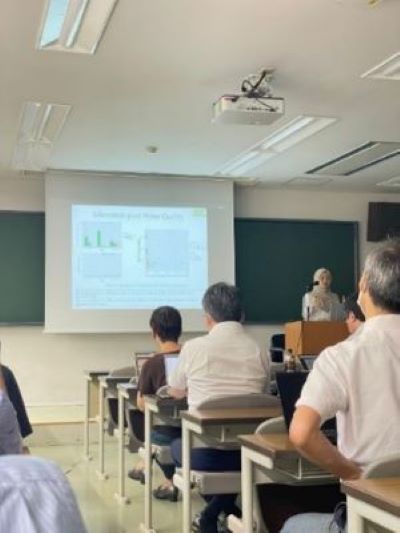
Photo: Presentation related to her research topic in Japan
Mr. Saiful
The objective of my research is to find the main causes and effects of scale deposition in the water supply pipelines in Surakarta via water quality analyses and the elemental analysis. Scale deposits in water mains are caused by the precipitation of poorly soluble salts, slowly attaching to the pipes over time and reacting with ions, especially iron and manganese, in water. They can damage water pipes and obstruct efficient water supply. I want to spread awareness of this issue and prevent these problems before they happen.
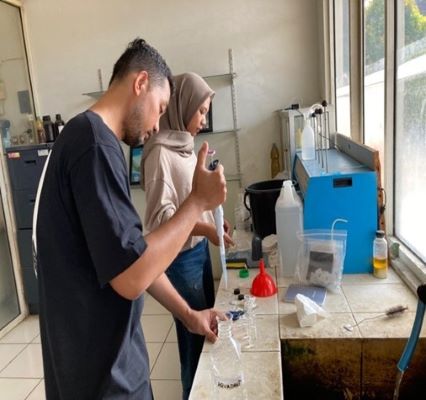
Photo: Analyzing the components of tap water in a laboratory.
Ms. Grace
I study water supply reliability in the countryside of Rwanda, and my case study is Ruhango district. Rwanda, as a country aiming to achieve the SDGs agenda No.6 and Rwanda’s own target, has made impressive progress in ensuring universal access to clean water. However, when tracking the progress towards the mentioned targets, it is very important to place much attention not only on the coverage of water supplies but also to the quality of water supply services, in particular, reliability of water supply services, since it can heavily affect citizens’ quality of life. Even though people have a purified water source, if they can barely access it, they end up using unclean water.
Ms. Masayu
I learned a lot from interesting lectures and seminars in University of Tokyo.
I’m also looking forward to participating in an internship on water supply-related company in Japan. I will absorb as much knowledge as I can from visiting waterworks facilities and listening to staff members.
Ms. Grâce
Academic life in Japan emphasizes on discipline and rigor. I experienced slight difficulty to get used to it in the biggening, but I improved my punctuality, which is essential for my personal and professional success.
In addition to this, professors and supervisors in my department were supportive to students’ study and research. I had opportunities to discuss my thesis frequently with my supervisor, and it helped me make constant progress in my research.
Ms. Masayu
The largest difference can be a planning of waterworks maintenance. In Indonesia, those maintenances are highly affected by external factors, such as a lack of handover and political changes. I feel that those maintenance plans are prepared more realistically in Japan.
However, technologies we are used to are like that in Japan. That’s because we have many companies and technical cooperations from Japan and also these two countries share similar geographical features and natural disaster characteristics together.
Mr. Saiful
I would say a percentage of non-revenue water and a water pipe maintenance are the main differences. Water is essential resource in multiple aspects, so we need more effective and efficient supervision of them.
Ms. Masayu
I challenged some outdoor activities for the first time in my life.
One of them is hiking. I started it form climbing Mt. Takao with my friends and I tried other mountains like Mt. Mitake and Mt. Hakuba. I really liked mountains’ pavements which make it easier for beginners to hike, and I also appreciated Japanese hiking culture including greeting and a family hike for children.
I also challenged skiing. Most winter sports are not available in Indonesia, so I was surprised to see my Japanese friends skiing well.
Mr. Saiful
I joined for Sado Island trip planned by JICA. I enjoyed tranquil atmosphere in local area and seeing Toki bird and Tanada, which is one of traditional rice field structures.
I also enjoyed travel many places around Japan. It is difficult to choose the best place, but I would say Morioka is my favourite. It is relatively cool and comfortable in summer, and we can visit historical structures. Spending all night at train station in Yamanashi due to the heavy storm is also unforgettable moment in Japan.
Ms. Grâce
I participated in several events run by JICA, and I got a wide range of experiences from them.
I also went on trips to many cities in Japan with my friends. I especially like to visit places with beautiful natural scenery, like Jogasaki, Shizuoka where I enjoyed the view of mountains and the ocean at the same time.
Ms. Masayu
General life is pleasant, the food is great, the people are nice, but I struggled with language barriers. I learned Japanese when I was an undergraduate student, but it was harder than I expected when it comes to using it in actual life. I tried to understand natural Japanese using anime and conversations made by people around me as a listening textbook.
Mr. Saiful
Tokyo was very convenient to live in, but I also experienced language difficulties, and a lack of information led by language barrier. I learned that trying to speak as much Japanese as possible in daily life was the quickest way to overcome this problem.
Ms. Grâce
Life in Japan in general is convenient and safe. Its public transportation is especially efficient, and it allowed us to live easily without a car.
However, I sometimes experienced some difficulty of living alone in a country with a very different culture. I relieved my uneasiness through talking my parents or friends in Rwanda by phone and joining an international community in a local church.
If you are not a person who likes being alone, I advise you to look for shared residences for international students.
Ms. Masayu
I want to continue my study to a doctoral, but in a couple of years. I have not decided what to study in master’s degree, but I am really interested in considering social aspects of issues related to water and waterworks. In the meantime, I would ask to be reinstated in the section that works with water supply, so that it is in line with my study.
Mr. Saiful
I will work again in the Ministry of Public Works and Housing, and I will try my best to implement what I have learned here to develop better water infrastructure in Indonesia.
Ms. Grâce
I will go back to Rwanda and resume my work for my institution. I want to contribute to the development of my country around water supply and sanitation by applying the knowledge gained during these 2 years of my studies in Japan.
Ms. Masayu
I hope you to make the most out of the opportunity to study in Japan and fully enjoy it.
I know there will be a lot of difficulty especially in language, but you should take it as a chance to learn more. Japan is not an environment where language mistakes are not tolerated, so feel free to challenge yourself.
Mr. Saiful
Please enjoy every single moment in Japan. Of course, your research project is the top priority, but do not stress yourself too much about it. I hope you broaden your friend circle, travel to various places and enjoy yourself in a way that you will not regret.
Ms. Grâce
Cultural differences become larger than you think when your home country is in distant area form Japan. In order to get used to Japanese life as fast as possible and fully enjoy your stay, I want to advise you to study about Japanese culture before arriving in Japan.
scroll